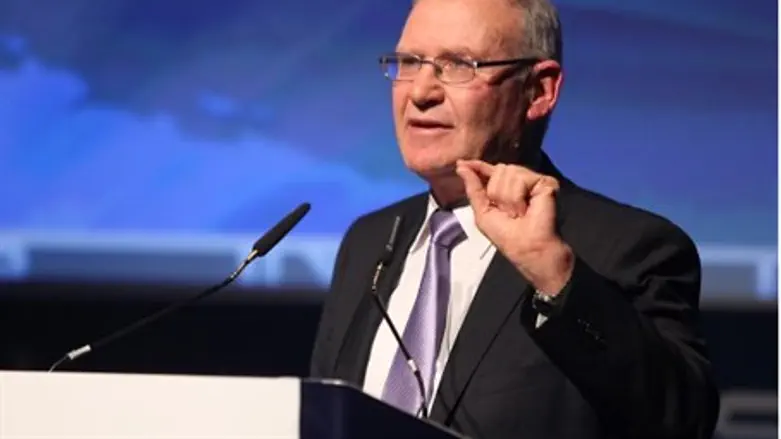
The former head of Military Intelligence, Major General (res.) Amos Yadlin, and Turki bin Faisal Al Saud, director of the General Intelligence of Saudi Arabia from 1979 to 2001, took part Monday in a rare one-on-one panel in an international conference hosted by the German Marshall Fund, and discussed the Iranian nuclear program, the Israeli/Palestinian-Arab conflict and other burning regional issues.
The very holding of the one-on-one panel, hosted by the Washington Post's David Ignatius, can be seen as a sign that the Iranian crisis and the perceived American abandonment of the interests of its allies in the region is indeed – as some analysts say – pushing Israel and Saudi Arabia much closer together than anyone could have dreamed just a few years ago.
Al Saud, the youngest son of the late King Faisal, urged that Israel sign on to the Saudi initiative, also known as the Arab Peace Initiative, and join the nuclear Non-Proliferation Treaty (NPT) in order to turn the Middle East into a nuclear-free zone.
Yadlin replied by saying that things were not so simple. “The real problem is that the Saudi initiative became the Arab League dictate in a summit in Beirut in 2002,” he said. “The Saudis modified it into a take-it-or-leave-it offer with parameters we can’t accept, mostly in the issue of returning the Golan to Syrians.”
Yadlin, who heads the Institute for National Strategic Studies, went on to explain why the Iranian nuclear program is a burning problem for both Israel and the Gulf states, in view of the extremist nature of the Iranian regime: "If this very radical regime will marry a very radical weapon, for a people that went through a mass killing 70 years ago, in a war that we were not involved in, based on hate crimes that we saw here in this city on Saturday, we have to be very worried. Very worried. And to [do] everything so that Iran will not possess a nuclear weapon. I do not remember that the Soviet Union wanted to destroy the United States of America and vice versa. They had different ideologies, each one wanted to have hegemony, politically, ideologically, but annihilation was not the target.
"When a country like Iran goes down this path publicly, and makes every effort that they can [even] without nuclear weapons – because Iran is the source of instability, of terror, of war in the Middle East. Who is helping Assad to survive? The Iranian proxies, like Hezbollah. The Iranians are involved in Yemen, in Bahrain, they are already controlling Iraq one way or another, and if they have nuclear weapons, I think some of the neighbors beside Israel have to worry a lot about it.”
Israel supports a nuclear-weapon-free Middle East, he said, but said building of trust and peace in the region must come first.
Al-Saud replied by saying: “Not signing the NPT should not be a license to develop nuclear weapons. And that is what Israel has done. So building trust is mutual. It's not one-sided.”
Arutz Sheva analyst Mark Langfan explained in a recent op-ed that while Israel and the Saudis want Iran’s nuclear program destroyed, “Obama is doing anything, and everything to, de facto, protect and enhance Iran’s nuclear weapons’ program.”
In addition, he pointed out, “Israel and Saudi Arabia see the destruction of Syria’s Assad as a prime element in the destruction of Iran’s waxing hegemonic enterprise from Tehran to the Mediterranean Sea.” And unlike other possible allies the Saudis could have chosen, “the Israelis don’t covet Saudi oil, or have designs on Mecca. They just want to tan themselves on Tel Aviv beaches, pray to the G-d of Abraham, and invent internet billion-dollar companies.”
As a result of this situation, Langfan opined, Israel and Saudi Arabia are finding themselves in a new Middle Eastern alliance that could include Greece as well.